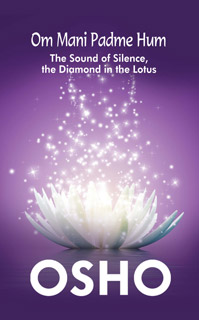The Sound of Silence, the Diamond in the Lotus

Om Mani Padme Hum
‘Nobody has to lead you and nobody has to save you,’ insists a radical and rebellious Osho as he launches a series of attacks on false knowledge and oppression. His vision is of a world changed by the love that arises from meditation. He considers the mantra ‘Om Mani Padme Hum’ the best attempt to describe ‘the beauty within yourself’. This inner truth is the ‘real thing’, not the teachings of society, politicians and priests.
Starting with the Chinese invasion of Tibet, and replying to questions on divisive educational systems, science corrupted by politics, and oppressive religions, Osho keeps saying that love is the key and we all have everything we need within ourselves.
The Sound of Silence, the Diamond in the Lotus … Nederlands
In het boek Om Mani Padme Hum, The Sound of Silence, the Diamond in the Lotus, de Klank van de Stilte, de Diamant in de Lotus, stelt Osho zich meteen radicaal en rebels op. “Niemand hoeft je leiding te geven en niemand hoeft je te reden” is Osho’s dringende stellingname. Het getuigt van de radicale Rebellie die Osho  niet alleen aanhangt maar ook door zijn eigen leven laat zien.
niet alleen aanhangt maar ook door zijn eigen leven laat zien.
Hij attaqueert de valse kennis die bestaat en de onderdrukking die plaatsvindt. Zijn visie betreft een wereld waarin liefde heerst die ontstaat vanuit meditatie.
Osho beschouwt de mantra ‘Om Mani Padme Hum’ als de beste poging om ‘de schoonheid in jezelf’ te beschrijven. Deze innerlijke waarheid is ‘het echte’, niet dat wat de maatschappij, politici en priesters ons leren.
Liefde is de sleutel, is wat Osho blijft aangeven en in feite is alles aanwezig wat we nodig hebben in onszelf. Binnen dit kader belicht hij de Chinese inval van Tibet. Verder beantwoordt hij vragen over onderwijssystemen die tot verdeling leiden, over de wetenschap die bedorven wordt door politici en over onderdrukkende religies.
Het boek Om Mani Padme Hum is niet gemakkelijk te verkrijgen. Mogelijk wel tweedehands via de Boekhandel. Er is een nieuwe paperback druk uit die alleen nog maar in het buitenland te bestellen is.
Impressie van Om Mani Padme Hum
This series of talks, based on Osho′s responses to questions, revolves around the theme of division – man′s being and its separation from his environment, his fellow man and from himself. Having pinpointed this fundamental and deeply felt problem for modern man, Osho offers his solution – rediscovering and realizing the whole man, an individual in whom the East and the West, the material and the spiritual, male and female, meet and harmonize.
“I have used the term ‘the psychology of the buddhas’ not to mean what it means. The man of enlightenment has gone beyond mind. In fact, the mind has faded just like dreams fade away. All the psychologies in the West are concerned with figuring out the functioning of the mind, how it works, why it sometimes works right and sometimes wrong. They have accepted one basic hypothesis which is not true: the hypothesis is that you are no more than mind; you are a structure of body-mind. Naturally, physiology looks into your body and its functioning and psychology looks into your mind and its functioning.
that you are no more than mind; you are a structure of body-mind. Naturally, physiology looks into your body and its functioning and psychology looks into your mind and its functioning.
“The first point to be noted is about those who have come to know a different space in themselves which cannot be confined by the mind and which cannot be defined as part of the functioning of it. That silent space with no thoughts, no ripples, is the beginning of the psychology of the buddhas.
“The word psychology is being used all over the world absolutely wrongly, but when something becomes conventional we forget. Even the very word psychology indicates not something about the mind but about the psyche. The root meaning of psychology is ‘the science of the soul.’ It is not the science of the mind. And if people are honest, they should change the name, because it is a wrong name and takes people on wrong paths. There exists no psychology in the world in the sense of a science of the soul.
“You are, for arbitrary reasons – just to be able to understand – divided into three parts. But remember, the division is only arbitrary. You are an indivisible unit.” Osho